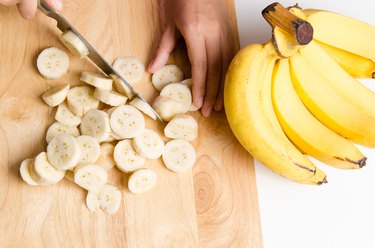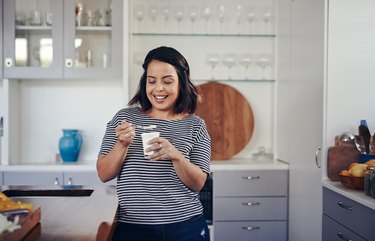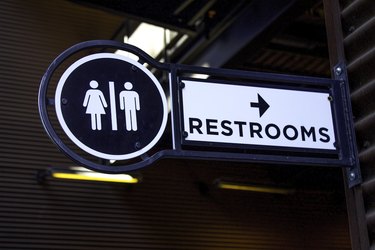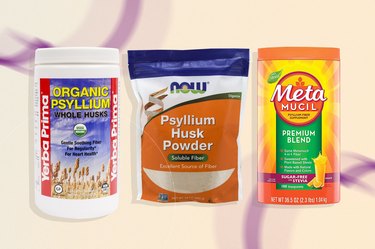
Diarrhea — a common condition often described as loose or watery and frequent stools — can be caused by a number of factors.
Diarrhea is typically related to an infection, medication side effect, food intolerance, food-borne illness or associated with a medical condition, according to the National Institutes of Health (NIH).
Video of the Day
Video of the Day
Most cases of diarrhea last a couple of days and go away without treatment. After an attack of diarrhea, your diet should focus on replacing fluid and electrolyte losses, avoiding certain foods that can make diarrhea worse and including foods that are easy to digest.
Although certain foods may aggravate diarrhea, fluids and other foods can help support recovery.
If your symptoms persist more than a few days, or if you are dehydrated or not able to drink enough fluids, see a health care professional. Your doctor will be able to advise best practices when you're recovering from severe diarrhea.
Keep these foods listed somewhere in the back of your brain in case of diarrhea; if it happens to strike, you'll know just what to eat.
The Best Foods to Eat after Having Diarrhea
1. Fluids (Plenty of Them)
When you have diarrhea, fluid replacement should be a priority. For diarrhea that is mild and short-lived, a variety of fluids will work, including broth, water and diluted fruit juices. If diarrhea lasts more than 1 to 2 days, an oral rehydration solution (ORS) should be added to prevent or treat dehydration and related complications, according to the American Academy of Family Physicians (AFP).
ORS products usually contain glucose, sodium, potassium and other electrolytes, and are available over-the-counter in powders for mixing with water, commercial beverages such as Pedialyte or Ceralyte. You can also make your own by following a standard recipe.
If you are dehydrated or have diarrhea that lasts more than 1 to 2 days, seek your doctor's advice on the use of ORS.
2. BRAT Diet Foods
After a bout of diarrhea, it's important to resume eating solid foods as soon as possible, per the Cleveland Clinic.
Historically, health professionals have recommended the BRAT diet — bananas, rice, applesauce and toast — for diarrhea management. However, this diet does not have research data to support its effectiveness or necessity, and is considered too restrictive to support adequate nutrition, per the Oregon Clinic.
While BRAT foods shouldn't be your only source of nutrition, they can be helpful to include in your diet plan when dealing with diarrhea. They are soft, easy to tolerate and are not known to worsen diarrhea.
BRAT foods are also lower in fiber, so they may help to make your stools firmer. They can be a good starting point in your transition back to a normal diet.
Applesauce is often recommended because apples are packed with nutritional benefits, especially after an attack of diarrhea. They are excellent for cleansing your digestive system and detoxifying your body. They're fiber-rich and contain the antioxidant power to fight infection and promote optimal health.
While apples may be harsh on the stomach, eating applesauce is a great way to ease the stomach and reap all the benefits of apples. Sprinkle some cinnamon in a small cup with applesauce. Avoid drinking apple juice, as it may worsen your diarrhea.
In addition to BRAT diet foods, try incorporating other easy-to-tolerate foods, including soups, plain pasta, potatoes, crackers, cooked cereal, soft fresh or canned fruits, soft cooked vegetables and tender, cooked meats or poultry.
3. Yogurt
While most dairy products are on the "do not eat" list for GI discomfort, yogurt is a notable exception.
Both yogurt and kefir, a fermented milk drink, contain probiotics that can restore the beneficial bacteria that your body flushes out with diarrhea.
An August 2017 American Family Physician study found that probiotics are highly effective for diarrhea caused by infection, antibiotic-associated diarrhea and even diarrhea from some gastrointestinal disorders, including irritable bowel syndrome.
Just be sure to read labels to make sure the yogurt or kefir are low in sugar, as higher levels of sugar can potentially worsen symptoms or diarrheal losses (that's water and electrolytes) in some patients.
Tip
If you're eating yogurt mainly for the probiotic benefits, make sure to look for The National Yogurt Association's Live & Active Cultures seal on packaging: It means that when manufactured, the yogurt contained at least 100 million active starter cultures per gram.
Most yogurt brands in the United States contain probiotics, but the organisms must be added after heat processing, so check the label to be sure. If it states "live and active cultures," then the yogurt has probiotics.
4. Oatmeal
Oats are a good source of both soluble and insoluble fiber. Soluble fiber helps reduce cholesterol, while insoluble fiber adds bulk to your stool. Eating oatmeal soothes your stomach, adds fiber to your diet and helps stop diarrhea, per the Cleveland Clinic.
Oatmeal can be calming after an attack of diarrhea; try topping with sliced banana for a nutritious meal that'll help combat your gastro troubles.
5. Crackers
In addition to the rice and toast prescribed by the BRAT diet, simple crackers crackers (like saltines) will provide your body with the energy it needs to recover.
Bland foods like crackers can help soak up some of the irritation-causing acid that sits in an empty stomach and prevent acid being released in the stomach, while heavier foods tend to cause more acid production, per the Cleveland Clinic.
Crackers are also beneficial because they contain salt — important for when you need to replace lost electrolytes.
- Are less likely to trigger nausea because they are odorless.
- Contain salt to help replace lost electrolytes.
6. Broth and Soup
While water is important after diarrhea to prevent dehydration, it does not contain electrolytes. Broths and soups that contain sodium are good picks that can help maintain your electrolyte levels
The best soup for diarrhea? Chicken broth is light, nutritious and gentle on your digestive system. You can buy chicken broth, use bouillon cubes or make your own homemade soup. Any of these will be warm and comforting.
Veggie broth can have similar effects. You'll want to stay away from creamy soups, which may add more to your troubles.
Resuming Your Usual Diet
There are many foods that can help you recover from diarrhea. But when the bout is over, you may be wondering how long you'll need to wait after diarrhea to eat normally and return to your standard fare.
A nutritious diet is important during and after diarrhea.
Continue to drink plenty of fluids, and transition your diet back a normal, healthful diet as soon as possible.
Focus on meals that emphasize fruits and vegetables, and a plan that includes whole grains, beans, calcium-rich foods such as yogurt or milk, and lean sources of protein such as fish or chicken — or plant protein, such as soy, nuts and seeds. After the diarrhea resolves, most people will be able to resume their normal diet.
Diarrhea can lead to severe, life-threatening dehydration, so contact your doctor right way if your diarrhea is severe or if it lasts more than a few days.
Also see your doctor if you are dehydrated and not able to drink enough liquids, advises the U.S. National Library of Medicine.
Infants and young children are at high risk of complications from diarrhea, so contact a pediatrician if this symptom doesn't resolve within 1 day, or sooner if fluid intake is poor or urination is decreased, or if you need guidance on managing this symptom in your child.
- National Institute of Health: "Diarrhea"
- Gastroenterology: Prevalence, Risk Factors, and Outcomes of Irritable Bowel Syndrome After Infectious Enteritis: a Systematic Review and Meta-analysis
- Merck Manual: Oral Rehydration
- Nutrition Issues in Gastroenterology: The BRAT Diet for Acute Diarrhea in Children: Should It Be Used?
- American Family Physician: Acute Diarrhea in Adults
- Cleveland Clinic: "Mom’s Advice Is Still the Best for Treating Diarrhea"
- Family Physician: "Probiotics for Gastrointestinal Conditions: A Summary of the Evidence"
- Oregon Clinic: "Brat diet"
- U.S. National Library of Medicine: "Diarrhea"
- Cleveland Clinic: "Ginger Ale and Saltine Crackers? 5 Ways to Ease Stomach Pain and Nausea"
Is this an emergency? If you are experiencing serious medical symptoms, please see the National Library of Medicine’s list of signs you need emergency medical attention or call 911.


